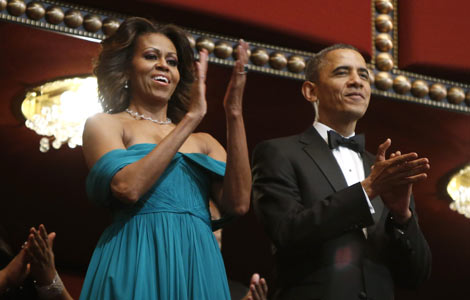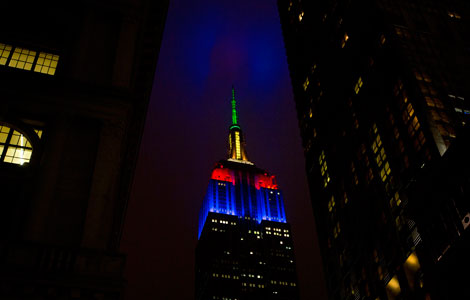

Hollywood has become hyper-aware of the potential for profits in China, which became the world's second-largest box office in 2012.
Predictions that the country will become the No 1 movie market worldwide in 2020 - combined with the success of the China-geared blockbuster Pacific Rim, which reaped $111 million in the country - have fueled Hollywood's desire to hit upon the right formula.
 |
|
US film star Bruce Willis (right) reads a book with Chinese actress Xu Qing in a scene from the movie Looper. Hollywood has paid increasing attention to the Chinese market, which is expected to be the world's biggest box office in less than 10 years. Provided to China Daily |
Attempts to cater to the Chinese market have so far produced varying results, including an occasional backlash against films that seemed to pander to the audience.
Only 34 international films are permitted in the Chinese market each year, but studios may get a pass on that quota if a movie is produced with at least one-third Chinese funding, is filmed in part in China and features a cast that is at least one-third ethnic Chinese.
Hollywood-produced films with Chinese characters or scenes are more likely to be included in the annual quota, while films critical of the country can face difficulties, not only with regulators but with audiences wary of being portrayed in a negative light by Western studios.
Movies such as Looper, Salmon Fishing in Yemen and Iron Man 3 have all deliberately included scenes tailored to a Chinese market. Pacific Rim featured an epic battle scene shot in Hong Kong.
To avoid offending Chinese viewers, World War Z was modified to exclude a scene in which a zombie outbreak was said to have originated in China. Red Dawn, originally about an invading China, was rewritten to substitute the Democratic People's Republic of Korea.
Obvious attempts to appeal to Chinese viewers have, at times, been called "condescending" by netizens, drawing negative reviews. Iron Man 3, which included extra scenes shot specifically for the Chinese market, was criticized for prioritizing the inclusion of those scenes above the pacing and plot of the film.
While promoting Gravity in Beijing recently, director Alfonso Cuaron was asked to explain his use of a Chinese spacecraft in the film. He told skeptical Chinese reporters that the choice had not been an intentional attempt to include Chinese elements.
Shots of the Shanghai skyline featuring big-name billboards rankled some Chinese viewers of Looper, an action film set in a future world in which China is dominant. "I'm from the future: You should go to China," one character advises.
Co-produced with China-based production company DMG Entertainment, the film opened with a disappointing $10 million payoff at the box office. In fact, few successes have come out of co-productions linking US and Chinese studios.
The Painted Veil, Shanghai and Snow Flower and the Secret Fan - all films featuring prominent Hollywood stars - flopped in the Chinese market.
Chinese audiences may be shifting away from Western films in general, with domestic films enjoying a 144 percent increase to $1.11 billion in the first half of 2013.
One of 2012's biggest surprises was the runaway hit comedy Lost in Thailand, a Chinese film that earned $195 million. By contrast, international films saw a drop of 21.3 percent to $675 million this year.
All of this has Hollywood scrambling to find the right mix. Transformers 4 will star Chinese actors Han Geng and Li Bingbing and feature scenes shot in China. Most innovatively, it has cast some roles in the movie from a television show aired in China.
The growth of the Chinese film market is being driven by the government, which is supporting the construction of 25,000 new cinema screens over the next four years, according to a 2012 report by business consultant Ernst & Young.
"The challenges for media and entertainment companies to penetrate China are still considerable. However, the vast potential of the market makes it impossible to ignore," the report said. "Companies will need to understand that investing in China is a long-term proposition, and those who can make that commitment will be in a much better position to succeed."
Although White House Down director Roland Emmerich said he does not believe cooperation or consciousness of the Chinese film market will affect the way in which individual filmmakers make movies, others have admitted that such considerations have powerful sway.
"If someone came to me and said, 'We're looking into doing a chunk of this in China,' well, I'd have to think about it," director Joss Whedon told Entertainment Weekly, referring to Avengers 2. "China is on my radar. It can't be at this point."
kdawson@chinadailyusa.com







